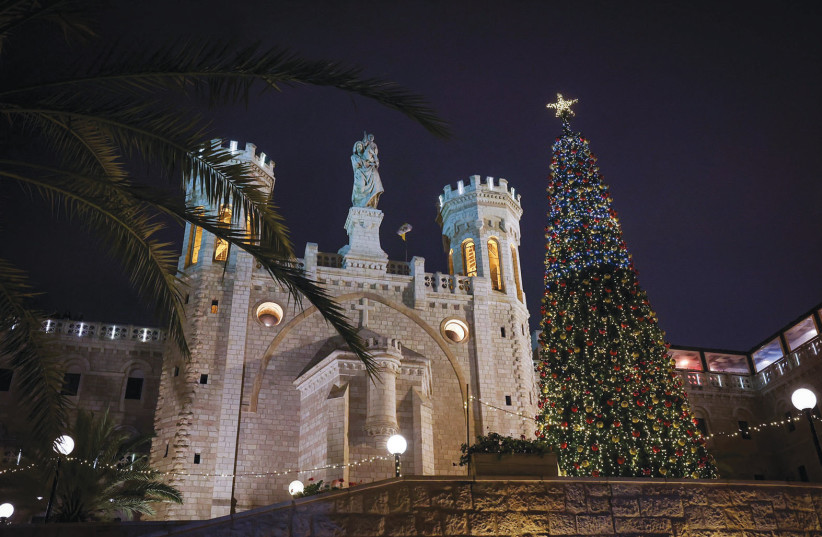Earlier this month, the patriarchs and heads of local churches presented a joint “statement on the current threat to the Christian presence in the Holy Land.” The statement itself is a remarkably cynical piece of political manipulation, which might have quietly disappeared on its own, particularly as not all the patriarchates even felt it worth publishing. But when it was picked up in the Western papers thanks to, among others, a response from the archbishop of Canterbury, that’s when this statement crossed over from being just more of the same into something rather more menacing: a statement that threatens precious decades of hard-won progress in Jewish-Christian relations.
The first victim was the truth.
There is no “concerted effort to drive Christians from the Holy Land.” In fact, Jewish Israelis (outside of the religious sectors), are increasingly aware of, interested in and eager to participate in local Christian culture. There are a stunning number of Israeli initiatives, both in the nonprofit sector and on the part of the state that work assiduously to support and strengthen local Christians. The fact that the vast majority of Christians in Israel are Arabs, means that Jewish-Christian relations here are very much enmeshed in the larger political context. But to turn a national struggle for independence into a religious one is dangerous and duplicitous.
In their support for the patriarchs’ statement, the Archbishop of Canterbury and Bishop Naoum freely lump Christians in Israel and Christians in Palestine together, a move that has rather more ideological value than it has real usefulness. The challenges facing Christians in Nazareth are different from those of Christians in Jerusalem, which are extremely different from those facing Christians in Bethlehem. It seems more than a little suspicious that the threats in all these cases seem to be from Jews.
Yes, to our great shame and chagrin, there are indeed radicals in Israel, and there are attacks on Christian clergy and holy sites. Their actions are criminal and inexcusable. Sadly, every society has their fundamentalists. We call on the state of Israel to vigorously pursue the identification and sentencing of those responsible for attacks on Christian persons, property and holy sites. But for every one of these radicals there are hundreds of thousands who refuse this brutal vision of the Jewish state.

The third paragraph of the statement is the most helpful for making sense of the real background, referring as it does to issues of real estate in the Old City. It is no secret that the Greek Orthodox Church sold properties in the Old City in 2004, which were ultimately sold to the radical settler group Ateret Cohanim, in order to cover some hefty financial debts. It’s also clear to us that there were many immoral actions on the part of the state in this fiasco. Without a doubt shady deals, the perversion of justice and the agenda of groups like Ateret Cohanim are deplorable, but the fact remains that this is not a campaign of persecution.
What is the actual threat to the Christian presence in Israel?
Strangely, the statement ultimately devalues the Christian presence in Israel, arguing that Christians should be protected because they generate revenue for the state of Israel and because they provide educational, social and health services quite disproportionate to their numbers. Both of these assertions are true. The Christian presence is indeed beneficial to the Jewish state, and it is essential that this be recognized. However, Christians should be protected because they are residents and citizens of Israel, like every other citizen of Israel. And Christians should be protected because they are an esteemed part of the local history, the present culture and the dynamic future of this country. For the patriarchs to rely on a notion of Christian “value” to the state is nothing short of demeaning.
There are indeed threats to the Christian presence here, perhaps the greatest one is emigration. We have been approached countless times by Arab Christians seeking our assistance in their efforts to relocate to the West. When we ask them about the importance of their Christian witness here, they seem slightly embarrassed and confused. They – quite reasonably – seek what so many other Israelis who leave Israel are after: a higher standard of living, a more gentle and lawful society, better educational opportunities for their kids. Arab Christians don’t leave because they feel persecuted. They leave because they don’t feel their presence here matters enough. And if that’s the case, then why not choose to live in Sweden, in France or in Canada. If the heads of churches want to do something really serious to strengthen the Christian presence here, let them continue to inflame the hearts of local Christians with pride, with identity and with a vocation, not as victims, but as torchbearers. That, and putting a halt
to selling off Christians’ precious patrimony and blaming the Jews, will help the local churches in their ability to offer truly good news to their own people.
Dr. Faydra Shapiro is the director of the Israel Center for Jewish-Christian Relations and research fellow at the Center for the Study of Religions at Tel Hai College in Israel. She can be contacted at director@jewishchristianrelations.com
Ms. Yisca Harani is an independent scholar, lecturer and consultant about Christians and Christianity in Israel. She has been teaching Israeli Jews on this topic for over 30 years. She can be contacted at yisca@yiscaharani.com
